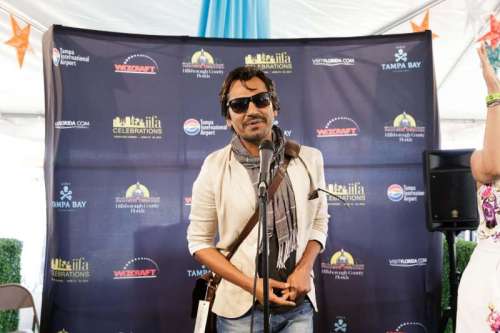
For an actor who has made his mark playing an arrogant Intelligence Bureau officer in “Kahani” and the villain with the heinous laugh in the recent blockbuster “Kick”, one would expect Nawazuddin Siddiqui to project a larger than life image, or at least an air of entitlement that stars of lesser talent don effortlessly. Instead, he explains for the benefit of an audience at Chicago’s Icon Theater, he is nervous, being ill at ease on a public stage.
In fact, Siddiqui said in an interview with IANS here that he has never allowed the need for an image to distort his craft as an actor. Siddiqui’s unswerving commitment to the craft and his apparent detachment to stardom appears to have been honed more by his setbacks – till recently his appearances in mainstream Hindi cinema were limited to a solitary scene,often of a torture victim – than his recent spectacular commercial and critical successes.
For Siddiqui, who grew up in Budhana, a village in the Muzzafarnagar district of Uttar Pradesh, a break in films was nothing if not fortuitous. When he moved to Mumbai, all he wanted were a few roles in television serials.
In a profession, where stardom is a destination, and narcissism an essential virtue, Siddiqui would seem to be a misfit. He struggled for about a decade trying to get a break and today he appears gratified, but not unsettled by success. After the success of “Kick”, he has been getting several offers for similar villainous roles, but has rejected all of them, keeping a promise to himself that he would not do more than one commercial film a year.
“I knew I would get offers to play the villain after ‘Kick’, and I had already decided to reject all of them,” he said, adding: “Fortunately, I have enough scripts to give me a choice. The success of ‘Kick’ will help in the marketing of other small budget independent films I have acted in. A big blockbuster like ‘Kick’ expands the audience for my films and makes it easier to promote them.”
Siddiqui was honored at the Chicago South Asian Festival for his “outstanding achievements”, where two of his films, ‘Liar’s Dice’ (India’s entry for the Oscars) and ‘Monsoon Shootout’ were screened, and where despite his reticence, he appeared to an audience favorite. He had earlier attended a similar festival in New York and was scheduled to attend another in Los Angeles.
One of his most cherished memories is of the time he spent with the reputed Chicago-based film critic, the late Roger Ebert, watching “Citizen Kane”(1941) , Orson Welles’ landmark work. “I had seen the film earlier, but watching it with Ebert was a unique experience,” Siddiqui said. “He explained the significance of the scenes, giving me a new insight into the film.”
Siddiqui’s exposure to films has been quite disparate – from C grade Hindi films, which were the only films screened in his village, to the best of international cinema at the National School of Drama in New Delhi. Two of the actors he watched in Budhana still remain his favorites – Dada Kondke and Joginder Shelly, who acted in such films as “Ranga Khush” and “Pyasa Shaitan”. The Hollywood actors he admires are Steve McQueen and Paul Newman. While he appreciates the art of Hindi screen legends like Bimal Roy, Guru Dutt and Dilip Kumar, his favorites veer towards the contemporary – director Anurag Kashyap and Manoj Bajpai, whom calls a vastly under-rated actor.
Coming to “The Lunchbox”, his film with Irfan Khan, which has been a commercial success and also won critical acclaim in the United States, he said his character in the film was modeled on a friend he has known for several years. “For me it was very easy, because I copied his mannerisms and his reaction to situations.”
One of Siddiqui favorite leisure activities is to listen to background scores. “Background scores allow me an absolute flight of the imagination and I travel in my mind’s eye. I do not like the scores to have vocal notes, because they act as a limitation to these flights of fancy,” he said.
The craft of acting is a journey and what fascinates him is the ability to delve into himself through it. “Acting is a process. Even now, I feel I am a beginner on this path, because it an ocean and I go into its depths with a great feeling of apprehension. There are a thousand different ways to play a character for example. You have to build on each character from zero, because they have no connection to the characters you played earlier. I strive to bring integrity to the roles I play. I think this is essential for an actor. I have done that in small budget films like ‘Miss Lovely’ or ‘Liar’s Dice’ or in a big budget film like ‘Kick’.
Siddiqui said he was overwhelmed by the compliment that legendary actress Waheeda Rehman paid him in her recent biography. “I am her fan. I do not remember the number of times I have seen her film, ‘Teesri Kasam'(1966).”
How does a village boy stay grounded through the commercial success and the wild accolades ?
Siddiqui sees no other choice. “It is my instinct to act that has brought me this far. It would be foolish of me to kill that instinct now by focusing on other activities like image building and starry tantrums.” He said he is still ill at ease promoting his films at media events, but does it nevertheless because his directors want him to.
Siddiqui is supremely confident that he can thrive purely on small budget independent films. “I have limited needs. If you have unlimited desires, of course, then you have a problem.”